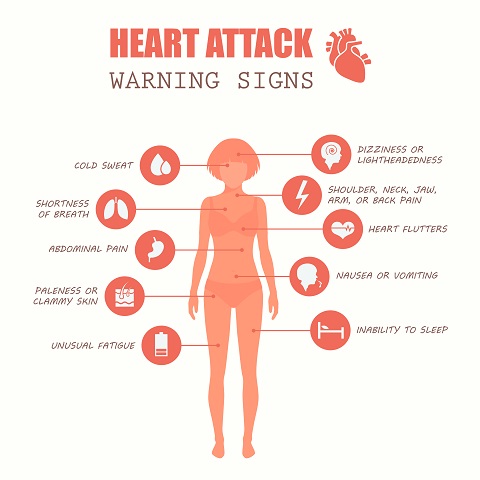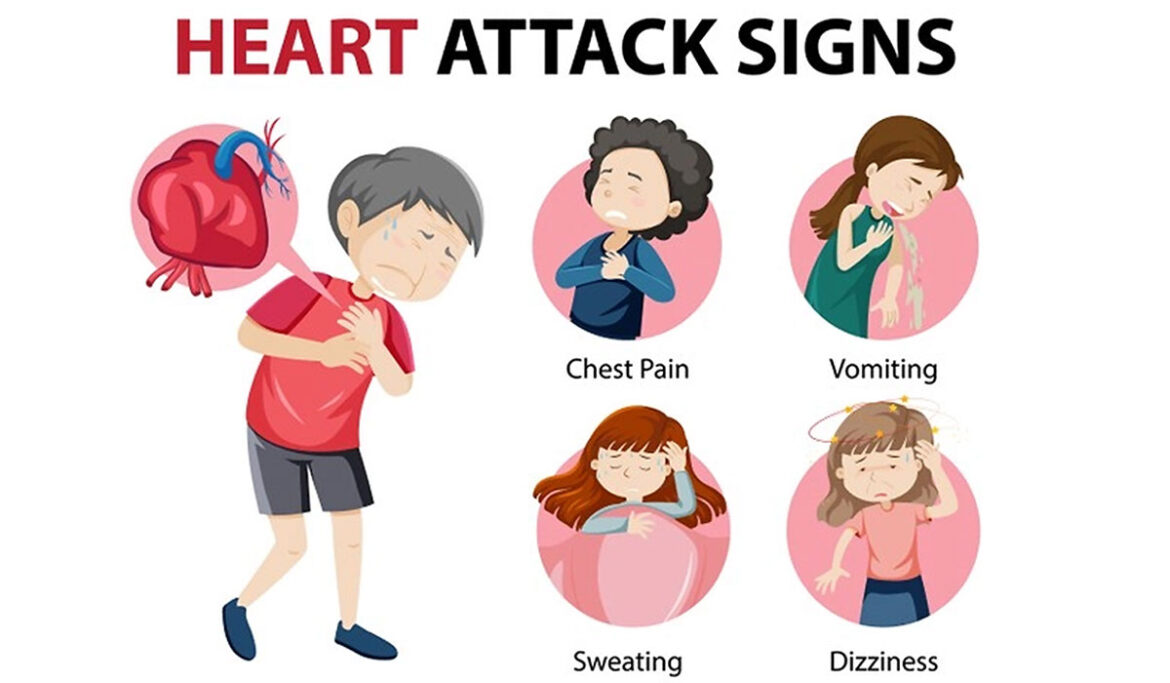We have always thought that a heart attack is always linked to chest pain. But did you that this is not always true? Heart diseases and heart failure do not have same kinds of symptoms, mainly in women. Human heart is basically a muscle which contracts for pumping blood to the human body.
 A heart attack occurs when the muscles of the heart do not get the amount of blood that is needed for carrying nutrients and oxygen. When a particular part of the heart does not gets enough blood, it can die or get damaged. This condition is known as myocardial infarction, quite hazardous and at some times, it is fatal.
A heart attack occurs when the muscles of the heart do not get the amount of blood that is needed for carrying nutrients and oxygen. When a particular part of the heart does not gets enough blood, it can die or get damaged. This condition is known as myocardial infarction, quite hazardous and at some times, it is fatal.
In some cases, heart attacks are sudden but in most of the cases, they are caused by chronic heart problems. Normally, the walls of the blood vessels, feeding the muscles of the heart, get covered by a waxy plaque. At some occasions, a blood clot or a portion of this plaque, breaks down and stops the blood from reaching the heart muscle through the vessels. This can cause heart attack. Even trivial looking problems like physical exertion, stress and cold weather can cause spasm or contraction in blood vessels. This lowers the blood amount which goes to the heart muscle.
Risk factors for heart attack:
- High blood pressure
- High cholesterol
- Heredity
- Poor diet
- Stress
- Obesity
- Physical inactivity
- Consumption of alcohol on excessive levels
Heart attack is an emergency condition and thus t is extremely important that we must look up for signs and pay attention to what our body is telling us. Seeking expert medical help is the key.
Difference between Cardiac arrest and Heart attack
The terms ‘heart attack’ and ‘’cardiac arrest’ are confused many times. Cardiac arrest is that condition when the heart best stops and death is on the cards. A heart attack is that condition when the heart muscle is damages, leading to reduction in the flow of blood to the heart, which doesn’t receives the required amount of oxygen for functioning. A severe and fatal heart attack can cause cardiac arrest. Nevertheless, problems like shock and serious arrhythmias can also lead to cardiac arrest.
Symptoms of a heart attack
It is very important that the early warning signs of a heart attack must be recognized so that treatment is sought quickly. A heart attack is generally slow and the person experiencing it, might not even be sure of this condition. The symptoms of heart attack vary amongst individuals. Signs that the person experienced in the first attack might be different from what he is experiencing in the second time. Though the most common symptoms are pressure or pain in the chest, but there can be a number of other signs too.
Following are the symptoms of a heart attack:
1. Discomfort/Pain/Squeezing feeling/Fullness in the chest
Pain in the chest can be the most typical heart attack symptom but this also can take a number of forms. In some cases, there can be no pain in the chest. Other appearances can be fullness, pressure, squeezing or pain the middle area of the chest. This uneasiness can stay there for a few minutes, then go away and then can be back. The pain or discomfort can be towards the back, or down to the arms or to the neck and the head. This symptom can be seen in both men and women but women can experience other symptoms also including shortness of breath, jaw pain, and nausea.
2. Headache, jaw pain, and toothache
During a heart attack, pain can go down to the head, back, jaw or to both the arms. Some people can also experience head ache and tooth ache. There is a possibility of these kinds of pains also in heart attack.
3. Shortness of breath
Dyspnea is a medical term for shortness of breath. Not being able to breathe properly or shortness of breath is another heart attack symptom. Difficulty in breathing cab happen during or before the chest pain, but in some cases, this problem can occur sans any pain in the chest during attack.
4. Nausea
The feeling or nausea or sickness in the stomach is a less common but a thinkable sign of a heart attack. In some cases, one can experience burping or hiccups with nausea while others may have the feeling of indigestion, related to heart attack. These symptoms occur mainly in women. In some cases, patients have also complained of experiencing flu.
5. Vomiting
In cases where heart attack is accompanied by nausea, there can be severe vomiting also.
6. Uneasiness in upper middle abdomen
In some cases, pain during heart attacks has been described as pain in the center of the general epigastric or pain the stomach. This pain is like a feeling or heaviness or uneasiness or sharp pain that can stay for a few minutes. This pain can be experienced without pain the chest.
7. Sweating
A heart attack can be accompanied by perspiration and sweating. Sometimes, the patients feel that is breaking out in a cold sweat.
8. Indigestion and Heartburn
In the same manner as burping and hiccups, some people also experience indigestion and heartburn. The feeling of pressure and pain can also occur in the abdominal area or burning sensation in the heart at the time of a heart attack.
9. Pain the arm or arms
The pain that occurs in the chest at the time of a heart attack, can spread to one (commonly left arm) or both arms as well as shoulders. This is a common symptom. This pain sometimes get extended to the fingers and the wrist.
10. Pain in upper back
During a heart attack, pain can also spread in the upper back. At most of the times, pain in the back that starts due to heart attack can said to be happening between the shoulder blades.
11. General sickness
A heart attack sometimes is accompanied by a feeling of general sickness when a person feels unwell. The person can experience tiredness and dizziness where he can or cannot faint. A vague feeling of illness persists. One can even experience a panic attack, like everything is going down the drain.
12. Zero symptoms
Around one quarter of all the heart attacks show no symptoms and this are called silent heart attack. There is no pain in the chest. This kind is quiet common in people suffering from diabetes mellitus.
We have now read that the symptoms and signs of a heart attack are quite mild and even imprecise, but it is very important that we understand that an attack with no or mild symptoms is as serious as an attack with severe pain the chest. Many time, medical attention is delayed as a heart attack is thought to be tiredness, tension, indigestion and anxiety. Timely diagnosis and proper treatment can save a lot of lives. Any kind of delay can be seriously damaging or fatal.
[Also read about Heart Treatment in India]
Related Posts:
A Guide to Minimally Invasive Heart Bypass Surgery
8 Ways to Lower Down the Risk of Heart Disease
A Guide to Atrial Fibrillation
10 Tips for a Healthy Heart
